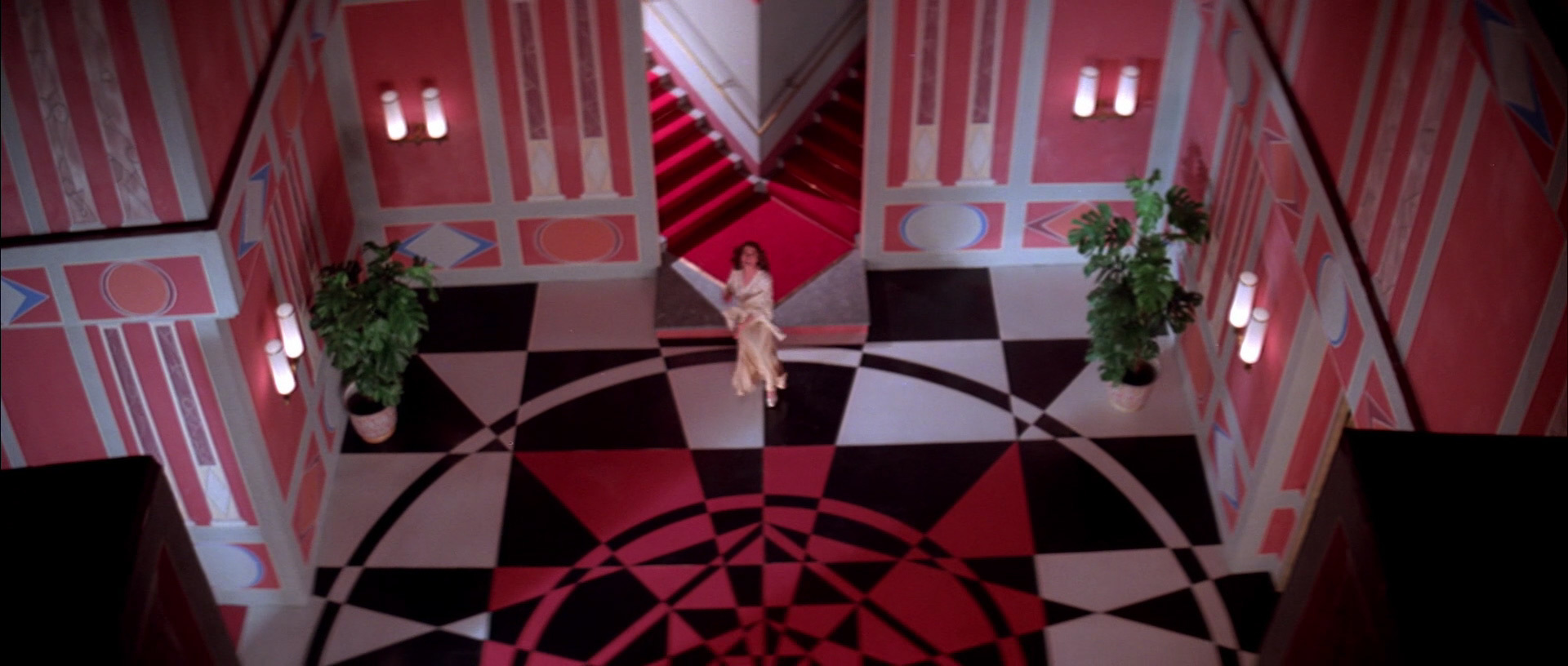Forty years ago today, Italian horror maestro Dario Argento premiered one of his most adored features, the spine-tingling Suspiria. The film follows Suzy, an American ballet student who enrolls at the prestigious Tanz Dance Academy in Freiburg, Germany. She quickly realizes Tanz is not as it seems, when a series of supernatural (and in some maggot-y cases, downright disgusting) apparitions reveal a gruesome plot. A remake of the film — starring Dakota Johnson, Tilda Swinton, and original Suzy Jessica Harper — is due out this year. But even with A Bigger Splash and I Am Love director Luca Guadagnino at its helm, it’ll be challenging to recreate what are arguably Suspiria‘s most enduring elements (aside from its phenomenal score, of course): its sumptuous set design and evocative cinematography.
The film’s use of vibrant colors — deep reds, shocking pinks, cool blues — and geometric 70s interiors remove it further from reality; its characters descend into a nightmarish world that’s equal parts gore and gloss (which makes sense considering Argento’s chief inspiration was Snow White). Suspiria‘s colors are made even more vivid by Argento’s Technicolor print processing, the same technique used in The Wizard of Oz and Gone with the Wind. Suspiria is one of the last films to be processed in this time-consuming and expensive way (cinematographer Luciano Tovoli reportedly “begged” to use the last Technicolor machine in Rome), and it’s all the better for it. Suspira‘s influence is evident not only in the horror films that followed it, but in movies far outside the genre, too (But I’m a Cheerleader‘s plasticky alterna-world comes to mind).
To celebrate Suspiria‘s 40th birthday, we’ve rounded up five other horror films with gruesome plots but gorgeous sets.
The Cabinet Of Dr. Caligari (1920): “This list wouldn’t be complete without this surrealist masterpiece,” says model Reid Rohling, a Gucci runway vet and devoted horror enthusiast who guides many of my bone-chilling Netflix selections by posting stunning stills on Instagram. The silent film — an allegory for German authoritarianism during World War I — follows a twisted hypnotist who commits murders through a sleepwalking agent acting on his behalf. “Every shot encapsulates the style of German Expressionism,” Reid explains of its iconic, extremely distorted set design. Twisting structures and shadowy landscapes are formed by sharp, jagged proportions — physically representing the film’s themes of madness, psychosis, and un-reality.
Jigoku (1960): Like an acid trip gone terribly wrong, Nobuo Nakagawa’s Japanese cult classic contains one of the most uniquely beautiful and singularly terrifying representations of the underworld on celluloid. Titled The Sinners of Hell in English, Jigoku is a story of murder, car accidents, secrecy, sex, guilt, and the underworld. Apparently, the film was not expected to be well received, as its production studio, Shintoho, was considered a factory for super gory, low-budget films. According to a making-of feature included in Jigoku‘s Criterion Collection edition, the film’s production was rushed, so extras joined the crew in helping build the sets for scenes which take place in hell, and dumped dirt all over the studio’s largest soundstage. However they pulled it off, Jigoku is packed with psychedelic visual effects like floating beds of roses and fields of glass shards.
Related: 10 horror movie soundtrack gems, featuring Mia Farrow, lesbian vampires, and Philip Glass
The Shining (1980): Room 237 is a nearly two-hour documentary devoted to exploring the many conspiracy theories about Kubrick’s most cult of classics. These people go in on everything: fanatical minutiae about the geometric carpet pattern, and a painstaking analysis of the Big Wheel bicycle scene, which reveals much of the Overlook’s interior. Though the exterior shots took place at Oregon’s Timberline Lodge (which will host a horror film festival named in honor of The Shining this April), most interiors were done in meticulously constructed sets — the biggest ever built at the time. “A world away from the dusty, peeling interiors usually seen in horror movies, the hotel interior envisioned by Kubrick is spacious and modern,” notes Den of Geek. “The set generates tension not through claustrophobia and dark spaces, but with high ceilings and lonely expanses.”
The Innocents (1961): “Martin Scorsese called it one of the scariest films of all time,” notes Reid of Jack Clayton’s psychological Brit thriller, based on Henry James’s haunting 19th-century novella The Turn of the Screw. Its screenplay was adapted chiefly by Truman Capote, who took home the Mystery Writers of America’s 1962 Edgar prize for his troubles. In a lavish mansion in the English countryside, a governess watching over two children fears they’ve become possessed by evil forces, and that their resplendent home is, too. “The shadows of the great halls add to the spooky atmosphere of this gothic classic, and equally chilling are the film’s exterior shots of the manor — which feature stately yet dystopian grounds and gardens dotted with chipped statues. It sorta looks like The Sound of Music meets Rebecca, with a little bit of the original Orphan, too.
Kwaidan (1964): Roger Ebert called Masaki Kobayashi’s Academy Award-winning Japanese flick “an assembly of ghost stories that is among the most beautiful films I’ve seen.” Kwaidan is an elaborate anthology of four unrelated but equally terrifying myths. Though the plots diverge, the film’s experimental score and stunning set design unite the ghoulish tales as a singular work of art rendered in a dreamlike atmosphere. Perhaps its most enduring images are found in its second segment, “The Woman of the Snow,” which features a pristine, snow covered forest illuminated only by a deep blue night sky.
Credits
Text Emily Manning
Still from Suspiria
